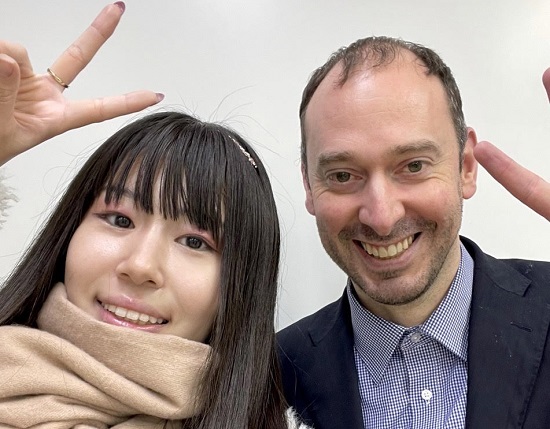
英語学習・留学に関する
お役立ち情報まとめ
【留学生体験談】オーストラリア・サンシャインコースト大学(アニマルエコロジー)進学 HIUC卒業生インタビュー

先日、HIUC東京校にオーストラリアのサンシャインコースト大学(動物生態学)に進学しているHIUC卒業生が遊びにきてくれたのでWes先生が英語でインタビュー!
実際の大学での授業についてやHIUCの授業で大学に役に立ったことなど詳しく話してくれました!
とてもリアルな話をしてくれたので、将来海外大学への進学を考えている方はぜひご覧ください!
▼▼▼▼▼▼▼▼▼▼▼▼▼▼▼▼▼▼▼▼▼▼▼▼▼▼▼▼▼▼▼▼
Hi everyone,
Thank you for reading our blog. My name is Wes, and I am the chief instructor at HIUC at the Tokyo school. I recently had the great pleasure of meeting one of our alumni, Kanako, who has finished all of her requirements for university and will be graduating from The University of Sunshine Coast (Australia) with a bachelor degree in animal ecology this April.
(いつもブログをご覧いただきありがとうございます。HIUC 東京校でチーフインストラクターを務めているウェスです。先日、HIUC卒業生の1人であるカナコが遊びにきてくれました。彼女はこの4月にサンシャインコースト大学(オーストラリア)を卒業し、動物生態学の学士号を取得する予定です。)
She was originally a student in the 2017 academic year. She started university in 2019. Unfortunately, because of the COVID-19 situation, she had to return to Japan around April 2020 and study online for two years until Australia opened up again. While studying, she volunteered and completed internships at 4 different organizations. She returned to the Sunshine Coast in February 2022 and completed the final courses to graduate. She also participated in the Workplace Learning and worked at the zoo for a total of 96 hours.
(彼女は2017年度の学生で、2019年に大学へと入学しました。残念ながらCOVID-19の関係で、2020年4月頃に日本に帰国し、オーストラリアへ再び入国可能になるまでの約2年間はオンラインで勉強することになったそうです。在学期間中、彼女は4つの団体でボランティア活動やインターンシップを経験し、2022年2月にサンシャインコーストに戻り、卒業のための最終科目を履修。また、Workplace Learningに参加し、動物園で合計96時間勤務をしました。)
We spoke about her time at HIUC and which skills were beneficial when she studied abroad, along with her experience overseas. The following is a transcript of the interview.
(HIUCでの授業についてや、留学時にどのようなスキルが役に立ったのか、海外経験とともにお話を伺いました。以下は、インタビューになります。)
Q. What did you like about studying at HIUC?
(HIUCで勉強してよかったと思うことは何ですか?)
A. I really liked the policy of not speaking Japanese in the building. All the classes were conducted only in English. Communication during the breaks between students and staff was also in English. I sometimes used Japanese at the beginning, but as I got more comfortable, my classmates and I even used English when commuting on the train.
(私は”建物内では日本語を話さない”というポリシーがとてもよかったです。授業はすべて英語のみで行われ、休み時間の学生とスタッフのコミュニケーションも英語でした。最初は日本語を使うこともありましたが、慣れてくると、電車で通学するときもクラスメイトと一緒に英語を使うようになりました。)
I still have all my notes and textbooks at home. I looked at the notes and comments. Even though there were a lot of mistakes, the feedback was positive, and I never felt bad. Students also had a good bond with the instructors. We could ask questions during the break, and by email outside of class times.
(今でも家にHIUCで学んでいた時のノートや教科書が残っています。ノートとコメントを見ると、間違いが多くても、フィードバックが前向きで、嫌な気持ちになることはありませんでした。また、学生は講師と良い関係で、休憩時間や授業時間外のメールでの質問も可能でした。)
Q. What skills did you learn at HIUC that helped you at university?
(HIUCで学んだことの中で大学で役に立ったことは?)
A lot of what we learned transferred to university. For example, in the higher-level classes, we learned research methods and how to cite papers. My university had a mixture of classes that wanted APA citations and Harvard references. I learned APA in the psychology class, and it really helped. Two of my reports were actually added to the next year’s course curriculum by the teacher. I think I was the first international Japanese student that this happened to. One of the reports was on rhinoceroses and elephants in a geoethics class.
(HIUC学んだことの多くは、大学で役に立ちました。例えば、HIUCの上級クラスでは、研究方法や論文の引用の仕方などを学びました。私の大学では、APAの引用を求めるクラスとハーバード・リファレンスを求めるクラスが混在していました。私は心理学の授業でAPAを学びましたが、これは本当に役に立ちました。実際に私のレポートのうち2本は、先生によって翌年の授業のカリキュラムに加えられました。日本人留学生でこのようなことが起こったのは、私が初めてだと思います。そのうちの1つは、地球倫理の授業でサイとゾウについて書いたものです。)
We made presentations in groups and individually, which was similar to my university. The main difference was the instructors at HIUC gave individual grades for group presentations, but in university, we were given a total group score. Grades were combined, and I was sometimes disappointed with the work done by my group and the corresponding grade. In the last semester of university, I had two major presentations. One was a 5-minute presentation on animal communication, followed by a 5-minute Q and A session. Students were not allowed a script or cue cards, but I had practiced this style at HIUC, so it was not new to me. I also had a 15-minute speech without aids except for PowerPoint slides, in which I had to find an article and critically analyze it. Many of the presenters started with, “Today, I am going to discuss…” I used one of the styles of getting attention I learned at HIUC and started with a question. The teacher was nodding along and looked pleased.
(HIUCで学んだグループと個人でのプレゼンテーションは、私の大学と同じでした。主な違いは、HIUCの講師はグループのプレゼンテー ションに個人成績をつけるのですが、大学ではグループの総合成績がつけられることです。成績は合算されるので、自分のグループの仕事とそれに対応する成績にがっかりすることがありました。大学の後期には、大きな発表が2つありました。ひとつは、アニマルコミュニケーションについて5分間発表し、その後5分間の質疑応答。台本やキューカードは禁止されていましたが、HIUCで練習していたスタイルなので新鮮味はありませんでした。また、パワーポイントのスライド以外の補助を使わず、ある論文を見つけてそれを批判的に分析するという15分間のスピーチもありました。多くの発表者は、"Today, I am going to discuss... "という言葉で始めていました。私は HIUC で学んだ注意を引くスタイルの一つを使い、質問から始めたら、先生はうなずきながら、嬉しそうでした。)
The reading classes I really hated, as they took a long time, but after going abroad, I realized that I needed those classes to get through all of the assigned readings in Australia. I found that I could not check every word but needed to understand based on context.
(リーディングの授業は時間がかかるので本当に嫌だったのですが、海外に行ってみて、オーストラリアでの課題図書をすべて読みこなすためには、この授業が必要なのだとわかりました。一字一句確認するのではなく、文脈から理解する必要があることがわかりました。)
The essays at HIUC are shorter than those at university, but I know that they were to help me build a base to be able to write papers of 5,000 words with 40 citations. Plagiarism was an important topic at HIUC, and the consequences were very clear. This was key to writing original content at university. HIUC did allow us to use Google for research, but my university only allowed academic sources from the university library or Google Scholar.
(HIUC でのエッセイは大学でのエッセイよりも短いものでしたが、それは私が40個もの引用を含む 5,000 語の論文を書けるようになるための土台作りにとても役立ちました。HIUC では盗作は重要なトピックで、その結果は非常に明確でした。これは、大学でオリジナルのコンテンツを書くための鍵でした。HIUCでは研究にGoogleを使うことができましたが、私の大学では大学の図書館かGoogle Scholarの学術的な情報源しか使えませんでした。)
Q. What advice do you have for future Japanese students who want to study abroad?
(これから留学を希望する日本人学生へのアドバイスをお願いします。)
The key is to be open-minded. No one is perfect, so people should not be afraid of making mistakes. I also saw many Japanese students who only hung out with other Japanese students, and their English did not really improve. There were also students who relied on electronic dictionaries and translators. Sometimes their writing was not clear because of the slightly different meaning of a word. Being able to communicate is the most important. It took a long time, but I have an English brain and a Japanese brain. I don’t need to translate so much between them. When I went to Australia at the beginning, people often asked me where I was from. Now, because of my accent, people ask either how long have I been in Australia, or if I was born in Australia.
(大切なのは、"オープンマインド"であることです。完璧な人間はいないので、失敗を恐れてはいけないのです。また、日本人同士でつるんでいるだけで、なかなか英語が上達しない日本人学生もたくさん見かけました。また、電子辞書や翻訳機に頼っている学生もいましたが、単語の意味が少し違うだけで、文章がよく分からなくなることもありました。コミュニケーションが取れるようになることが一番大切です。時間はかかりましたが、私には英語脳と日本語脳があります。だから、そんなに翻訳する必要はないんです。オーストラリアに行った当初は、どこから来たのかとよく聞かれました。今は、私のアクセントのせいで、オーストラリアに何年住んでいるのか、オーストラリアで生まれたのか、と聞かれるようになりました。)
Q. What are your future plans?(今後の抱負をお聞かせください!)
A. I plan to go back to Australia and go to my graduation. I would like to gain some more experience, so I might volunteer at the zoo again, or hopefully get a job there. This will help me gain more experience that I can use when I go to Africa and help the animals there. In the end, I really want to work at an international organization and educate people to change their minds from animal anthropocentrism to biocentrism.
(オーストラリアに帰って、卒業式に出る予定です。もっと経験を積みたいので、また動物園でボランティアをするかもしれないし、できればそこで仕事を得たいと考えています。そうすれば、アフリカに行って動物たちを助けるときに使える経験をもっと積むことができます。最終的には、国際的な組織で働き、人間中心主義から生物中心主義に考えを変えるよう、人々へ教育をと考えています。)
▲▲▲▲▲▲▲▲▲▲▲▲▲▲▲▲▲▲▲▲▲▲▲▲▲▲▲▲▲▲▲▲▲▲▲
HIUCではみなさんをサポートするための最初のステップとして、留学カウンセラーがみなさんの現在の状況、夢や目標をお伺いします。その上で、一人一人に合ったご提案をさせていただきます!
是非、下記よりお問い合わせください。お待ちしています!
無料のカウンセリングはこちらから!